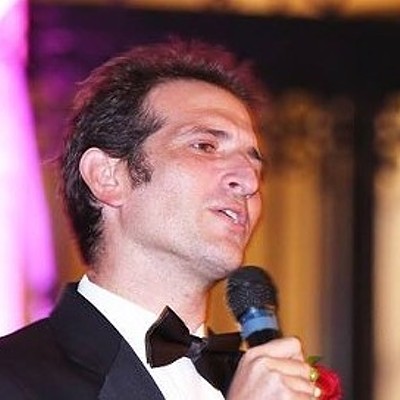Dr. Dog has built a cult following over the past decade. On its current tour opening for hugely popular folkies the Lumineers, the Pennsylvania band is introducing its brand of indie, neo-psych, jam sound -- or what it likes to call rock 'n' roll -- to a whole new audience. Dr. Dog recently released its newest album, B-Room, which this handy sextet named after the recording studio the band jointly built. Three weeks into the tour, New Times spoke with singer and guitarist Scott McMicken about philosophy, Motown, and whether the name Dr. Dog has helped or hurt them.
See also: Top 5 New-Americana Artists You Should Be Listening To
New Times: The reviewers are comparing your new album, B-room, to Motown. Was that a big influence on the record?
Scott McMicken: Yeah, Motown's an influence for us in so many ways. Because we decided to set things up with this record in a more live fashion, it's more apparent than just a bass line here or a tambourine there.
What were the other strong influences on B-Room?
Four-on-the-floor rock 'n' roll. Live, we've generally been more rocking since we're heavily guitar-based, while in the studio, we tended to rely on guitars far less. What was most compelling for us as a band on this record was a simpler approach. And simplifying things was a real challenge.
Like, we play Motown songs a lot, at parties or at a buddy's wedding, so we know all the covers. It's been real interesting to take a classic song like from Smokey Robinson and break it down so it's clearly laid out what each instrument is doing; then it's interesting to see we'll play the same exact notes at the same tempo and rhythm, but it doesn't sound like the song at all.
What it's missing is the ensemble, the swing, and that feel is what will appeal to a listener. We've never constrained ourselves to a genre, so a song like "Phenomenon" was our take on country, and "Cuckoo" as a piano instrumental was based on the Magic Band.
Has there ever been a time when you recorded a song thinking it sounded one way and the audience's reaction was it sounded like something else?
No. A resounding no. The way this record has been received, it's like here's another album of Dr. Dog doing what Dr. Dog always does.
I guess it's a compliment that here's those guys doing what they do pretty good, and here's another thing of that thing they do. The perception of the band is we always do the same thing, and for us, it certainly doesn't feel that way, no matter how much we stray with lo-fi Casios or heavy dirty punk rock that's almost metal. Maybe it's inherent in our songwriting or our voices or personalities or our message that ties it all together.
What is your message?
The theme that permeates what Toby and I write is the pursuit of accepting things that are beyond your control and a reminder of your humble position in life. To be able to dig into your own experiences and emotions while making it clear we're one small drop in a big bucket.
Your new album shares the name with the recording studio the band collectively built. What was tougher, constructing the studio or the album?
Probably the album, because it's a little more intangible making music than walls. The construction was part of the challenge, but it taught us how to be collaborative and how to be useful. Admitting where you don't belong became a real virtue. The construction was a real good way for us to get together and get started. And as a team, we were able to build something that we're really proud of.
Your concert here at Sunset Cove is at an outdoor venue. Does playing outside change your approach from when you perform indoors?
Absolutely, and we've never been more aware as a band of the difference. We're three weeks into the tour with the Lumineers, and it's been a long time since we've gone on the road as an opening band, let alone opening for a band with such a huge audience.
It's required a shift. Not just because of the environment but because instead of playing in front of our fans, nobody here knows who we are. Feeding off the energy of a crowd and giving it back inside a smaller club is a different game than being on a vast outdoor stage where the bulk of the people look like little specks. All the subtlety and nuance you're used to focusing on in smaller clubs don't translate, and you have to figure out how to open up. It's a process we're learning about a lot on this tour. Coming full circle, it's again about simplification, which doesn't mean you have to dumb it down.
I'll do the dumbing down then with my last questions. How did you guys come up with the name Dr. Dog?
It was just a random conversation between Toby and I many, many, many years ago. Back then in the different world that was our life, it just popped out. There's no grand story; it just came out, and it stuck.
Do you think the name has helped the band's success or been a hurdle?
It's been a little of both. But ultimately, that's to the credit of the band. The name is contentious, but we're a contentious band in a lot of ways. The fact that our name is divisive goes with everything we do. We're a love it or hate it kind of band, and we enjoy that.
Lumineers. With Dr. Dog and Nathaniel Rateliff. 6:45 p.m. Sunday, October 20, at Sunset Cove Amphitheater, 12551 Glades Road, Boca Raton. Tickets cost $35 with fees.
Call 561-488-8069, or visit ticketmaster.com.
Follow @CountyGrind











